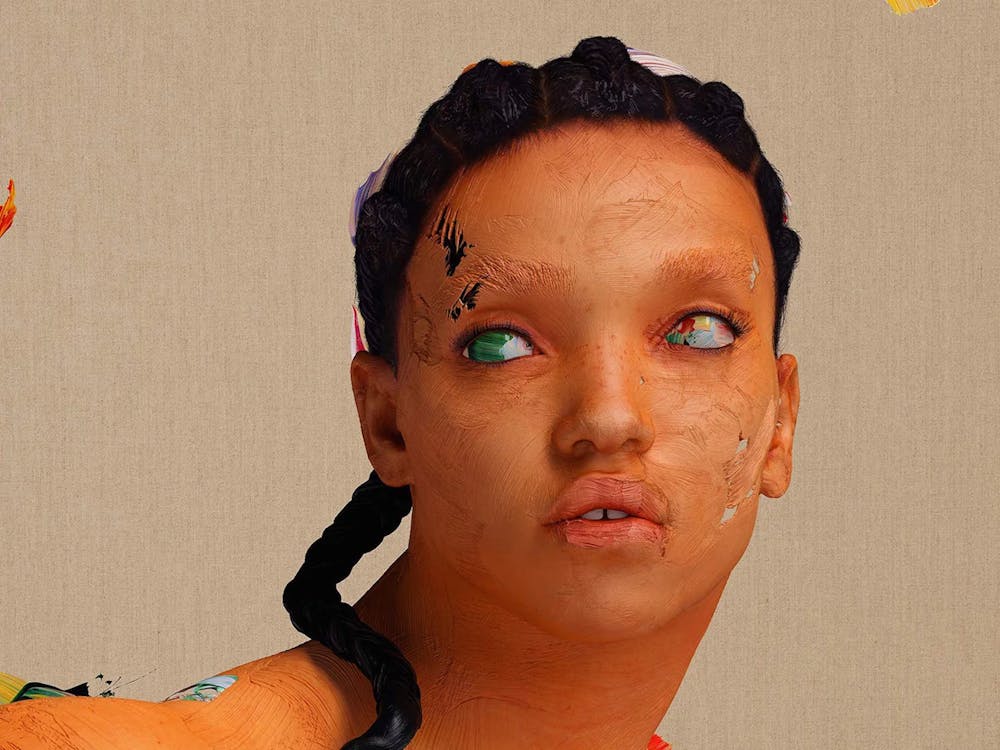Mary Magdalene is one of the first women history robbed. Popular culture tells us she was a former prostitute, but at the origin of this legend is an old, powerful white man: Pope Gregory I, who conflated Mary Magdalene with an unnamed “sinful woman” found elsewhere in the Bible. Fifteen hundred years later her image has hardly recovered. In “Magdalene,” FKA twigs’ second full-length LP, the British musician and performer imagines that Mary Magdalene is Jesus’ lover and equal, turning on its head the traditional, patriarchal narrative.
While Mary Magdalene appears prominently in only one song on the album (the track “mary magdalene”), her inspiration reverberates throughout its 38 minutes of magnificent art pop. In the years since the 2014 release of her debut full-length album, “LP1,” FKA twigs soloist Tahliah Barnett endured tabloid speculation about her relationship and subsequent break-up with Robert Pattinson; then, after months of chronic pain, she underwent surgery to remove six fibroid tumors. Her latest record’s biggest moments offer catharsis amid this suffering: Using a deified version of Mary Magdalene as a model, FKA twigs reclaims agency in a world that attempted to confine and define her narrative.
Barnett’s artistic imagination of Mary Magdalene sits alongside real ground-breaking scholarly work on the issue. Elizabeth Schrader, a PhD candidate in Duke’s own religious studies department, is making waves with her bold theory that early (male) transcribers of the gospels diminished Mary Magdalene’s role by splitting her into three separate “Mary” characters. But in the end, “Magdalene” doesn’t seek to seriously posit any such theory — it is, at its core, an album that in its alternate moments of organic and distorted sound communicates heartbreak at its most raw and wrenching.
The first single and album closer “cellophane” best demonstrates these high emotional stakes. “Didn’t I do it for you?” Barnett gasps at the outset, as she is joined by shy touches on a grand piano. Later, it is within a single vowel — the long “I” — that she releases her tension, sweeping from a crackling growl to a shuddering, stunning vibrato one octave above: “And I just want to feel you’re there.” A man’s whispery beat-boxing chugs reliably behind her vocals, until the climax strikes, nearly all accompaniment drops and Barnett’s voice leaps to new breathy, heartbroken heights. As soon as she pronounces the song’s title — “All wrapped in cellophane,” Barnett sings — metallic slicing and scratching sounds veer to the foreground and threaten to drown her out.
In the music video for “cellophane,” Barnett pole dances in chunky metal heels amid a golden haze, twisting and ascending until she encounters a metal dragon with an uncannily humanoid face; she then spirals downward in a warp of murky colors and diaphanous peach fabrics. The potential comicality of the concept hardly registers, however, in the face of Taliah Barnett’s indecipherable, compelling eyes. She has a story to tell, and this time it’s her own weird, twisted version of reality that, to us, looks rather beautiful despite the intrusions.
Industrial noises and orchestral flourishes accent FKA twigs’ balladry throughout “Magdalene,” largely due to the eclectic team of producers and musicians she corrals for each song. The credits include contributions from electronic composer Nicolas Jaar, pop producer Benny Blanco and indie pop veteran Jack Antonoff. It’s not surprising then that “Magdalene” transcends traditional genre categories.
On opener “thousand eyes,” FKA twigs channels medieval choir melodies over increasingly chaotic buzzing synths. Her vocals range from haunting vocoder-ed harmonies in “home with you” to distorted whispers in “mary magdalene” and Ariana Grande-like runs in the chorus of “holy terrain,” the closest “Magdalene” gets to pop radio sensibilities. Still, it’s hard to imagine Ariana Grande ever singing, as FKA twigs does, “I’m blue when the moon hits my skin right / Hot pink when you open up my sweet thighs.” Coursing with religiosity and desire, the provocative lyricism of “Magdalene” is an improvement from “LP1” — and FKA twigs finds the textures that complement and showcase her vocal expressiveness.
Tahliah Burnett’s face features prominently on the cover of “Magdalene” — only her skin is orange, her black braid is snake-like, her eyes are pupil-less and errant patches of color appear like glitches in a hologram. Perhaps she’s a fallen alien or Mary Magdalene reincarnate, but she’s certainly not quite human. In heartbreak and suffering she attains an other-worldly state, an ex-stasis of holy magnitude, an existence in holy terrain.
Get The Chronicle straight to your inbox
Signup for our weekly newsletter. Cancel at any time.

